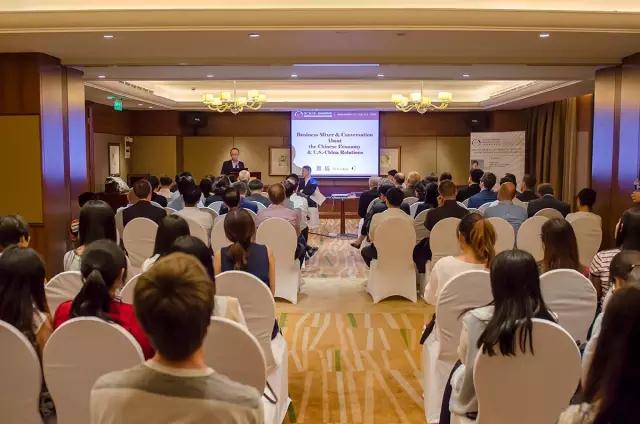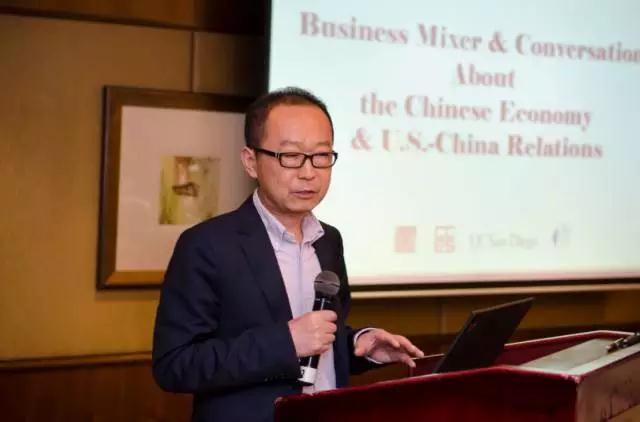
近日,上海-加州创新对话在复旦大学成功举行。本次对话首次设立圆桌对话预热场,加州大学圣迭戈分校全球政策和战略学院Susan Shirk教授与复旦大学经济学院院长、中国经济研究中心主任张军教授,以“未来中美关系中的福利与创新”为主题进行了报告和交流。对话由蒋昌建副教授主持,全程英语进行。

基于政策调整的角度张军教授解读了中国经济增长率下降的原因。张军教授认为,为应对2008年全球金融危机,中国政府批准了一揽子经济刺激计划,结果虽然促进了总需求的增长,却导致了地方政府和企业部门债务的增加。这限制了国家能力的扩充。中国政府一直不愿意实施需求侧的政策。
为什么政府应该在供给方面达成共识?
张教授认为,从长远来看,通过从需求侧政策转向供给端政策,中国政府能够解决基本面的问题。张教授认为,结构改革尽管很重要,但是并不容易。供给方面的政策也有它的局限性,比如它的执行时间会很长,而且面临各部委的政治阻力。哪怕得到了全面实施,在短期内结构改革方案,也达不到中国经济的名义增长的要求。固定资产的名义增长率是每年8%,而五年前这一数字是25%。
中国可以利用财政和货币政策
中国不应仅关注一种政策,应将两种政策结合。首先,政府应该改变不要出台经济刺激政策的看法。通过引用中国国家统计局公布的数字,张军教授发现中国不同地区对经济刺激方案的反应有很大不同。张教授认为这有助于政府知悉各地经济增长的来源并不相同。东部沿海省份的经济增长率位于全国平均水平,而东北部省份则增长缓慢。中国中部省份尽管资源丰富,但也出现了GDP的大幅下滑。然而,西南省份出现了更好的增长态势,蓬勃发展的服务业给当地经济提供了强大的增长驱动力,尤其是在运输、物流、IT、技术和金融方面。
中美关系对两国未来的发展非常重要
尽管劳动生产率的毛增长率放缓,张军教授仍乐观认为从长期来看中国会成为一个有效率和有竞争力的市场。张教授认为(中美)双边关系非常重要。中国需要消除进入壁垒,允许国际和国内私有企业参与到服务业之中。美国市场对中国很重要,因此美国市场也需要找到让中国企业更好地参与进来的解决方案。有了良性且稳定的中美关系,中国方能实现到2020年国民收入翻一番的目标。

建立合作的关键点
Susan Shirk表示,中美关系正处于合作与对抗的转折点。“两国是否能继续合作并求同存异?”Shirk教授向听众提出了这个问题。她认为,两国如果不能尽快采取一种积极的方式,那么可能会失去合作机会并走向对抗。
区域问题的分歧会破坏全球稳定
Susan Shirk教授认为,从全球层面上来看的时候,(中美)两国关系是很不错的。她以气候变化、伊朗核问题和全球治理等为例,肯定了中国在全球事务中发挥的作用。此外,中国的投资活动一直活跃在世界各地。在区域议题上,中国和美国存在不一致。Shirk教授指出,在南海中美的飞机和船只摩擦不断并导致军事冲突的升级。另外,中美两国在中国东部海域的领土权和台湾海峡的海上主权都有争论。
中美两国的关系自冷战以来变化较大
Shirk教授认为,目前中美两国政府正着力打造、并且比以往任何时候都更加强调(各自的)价值。历史上,亚洲的势力范围被分为两块,一块是美国、日本和法国,另一块是中国、俄罗斯、柬埔寨和老挝。“我们经常说,我们与中国的关系不同于冷战时期的紧张局势,”Shirk教授说,“但现在中国领导人在唤起美国颠覆中国的观点,在美国方面,奥巴马政府正在推动跨太平洋伙伴关系,问人们更想让亚洲经济体按美国还是中国的规则来运作”。Shirk教授将这定义成美国的参与战略,和中国的安全战略。
连接和参与的方法
“一些对参与论持怀疑态度的人说,中国现在表现得很友好是因为他们现在实力比较弱”Shirk教授说。(该论点成立的)前提是中国处在发展阶段,主要选民也是在工商业界,中国作为一个崛起中的大国并没有侵略性。然而,以前邓小平就明白,随着中国的崛起,把中国当作威胁的观念也会随之滋生。这会造成其他国家形成联盟对抗中国的风险。因此,中国面临的挑战是如何保证自己的意图是良性的。因此,加入20国集团之类的组织对中国的国家安全非常重要,因为它提供了一种与其他国家连接的机会。
中国的行为改变走向对抗
Shirk教授表示美国需要有所反映,原因是近期中国的行为出现了三个变化。首先是国家安全优先权的变化。Shirk教授认为,“中国想在南海建立主权,是不可能不和周边国家继续发生冲突的”。如何处理该地区的局势在很大程度上表达了中国在该地区的意图。要和美方合作,中国应该考虑优先解释某些说法,如航行自由等。二是国际公司感觉他们没办法在中国参与竞争了。因为感觉被歧视,这些企业希望美国政府能对外国公司采取更强的非关税壁垒作为回应。最后,中国国内的政治态势对合作造成了阻碍。Shirk教授表示,尽管中国公民的社会权利、自由和获取信息的能力在逐渐增加,但近年来这些增长趋势在中国出现反转,这引起人们对其意图的关注并为他们与中国的合作设置了障碍。
美国政策需要推动中国走向合作
Shirk教授总结认为,这些变化的存在,使得美国对华政策趋紧,尤其是 其感觉到自身利益受到伤害时,美国会施加更加压力给中国。“有时要找到不会对美国产生危害的解决方案也很难,”她说,“但是当对中国施加压力时,你得保证中国会有好处并微调他们的反应。”美国政策的目标是通过参与和保证将双方关系导入积极轨道。国内背景和政治观点都很重要。这很复杂,因为美国不能依靠军事手段,所以很难通过切断或者减缓(他们的经济)来建立合作。此外,政治家和政治勇气的作用至关重要:是否通过冒险和影响中国以使双方关系得到积极发展,这取决于美国的意愿。

在问答部分,Shirk教授认为奥巴马政府在亚洲发挥了更轴心的作用。Shirk教授认为在2009年亚洲之行中奥巴马政府感到他们的积极动机并没有收到很好的回报。譬如说,自克林顿以来每个总统都发表了电视讲话,唯独奥巴马没有。
张军教授对“房地产市场一直用来帮助刺激经济”的观点进行了回应,他表示,在中国固定资产投资以刺激经济的作用并不大。在问到国家是否应该改变他们对TPP的态度时,Shirk教授表示,美国推行贸易协议非常困难,为了反击而反击是没有意义的,美国需要提供更好的政策来鼓励与中国的合作,但也存在着很大的不确定性。
给张军教授的最后一个问题是,他对中国经济发展有什么样的政策建议。张教授表示,他希望看到政府更多尝试财政政策,因为高杠杆问题使得货币政策的作用变得有限。中央政府可以通过债券市场而不是通过银行贷款来融资,这可以为需求方提供更多的流动性,但又不会提高负债率。张教授还认为需要更好地鼓励当地市场的作用。另一个可行的政策需要考虑税率方面,着力于减轻商业部门的负担。
On September 12-14, 2016, the Shanghai-California Innovation Dialogue was held at Fudan University in Shanghai, China. Susan Shirk, research professor at UC San Diego School of Global Policy and Strategy, and Zhang Jun, Professor of Economics at FudanUniversity, gave their perspectives on the future of US-China relations, with the theme of welfare and innovation.
Professor Zhang gave his take on why the rate of growth has slowed in China due to a shift in policy. In response to the 2008 global financial crisis, the Chinese government approved of a stimulus package which boosted aggregate demand but increased debt in local governments and the corporate sector. This constrained the ability to expand capacity, and thus the Chinese government has been reluctant to pass demand-side policies.
Why should government make a consensus to go to supply side?
Zhang believes that by shifting from demand side policies to the supply side policies, the Chinese government has been ableto fix the fundamental issues in the long run. “Structure reform is not that easy, even though it is vital, Zhang states. Supply side policies do have its constraints as well, taking longer to implement and met with political resistance by Ministries. In the short run, structure reform programs, even if fully implemented, cannot accommodate the nominal growth of the Chinese economy. The nominal growth of fixed assets are now 8% annually, when five years ago it was at 25%.
China can utilize fiscal and monetary policies
Rather on focusing attention to one type of policy, China can look toward using both. First, the government needs to change the sentiment that another stimulus package should not be repeated. Zhang cites numbers released by the Chinese National Bureau of Statistics shows that different parts of the country reacted to the stimulus package differently,which can help the government break down sources of growth. East coast provinces are at the national average, while most north-east provinces have sluggish growth. Middle China provinces, although resource-rich, also suffered from a big drop of GDP. However, the south-west provinces are performing better because of vibrant growth of the service sector. The service sector has been the driver in these areas, specifically in transportation, logistics, IT, tech,and finance.
Relations are important for the future
Despite the gross rate of labor productivity slowing, Zhang is optimistic that in the long run China can become an efficient and competitive market. “Bilateral relations are very important,”state Zhang. China needs to be able to remove barriers of entry to allow private participation of both international and domestic firms in the service sector. Furthermore, the US market is necessary for China, and thus the US market also needs to find solutions to incorporate participation of Chinese firms. With this, China can meet its national goal to double income by 2020.
Critical point for building cooperation
Susan Shirk stated that US-China relations are at a turning point of cooperation versus confrontation. “Are they going to continue cooperation and build a foundation despite differences,” Shirk posed to the audience. She believes that if we are not able to get on a positive path soon, we may lose the opportunity and head toward confrontation.
Differences in regional issues can harm global stability
“When you look at relations on two countries at the global level, they are pretty good,” said Shirk, citing issues such as climate change, Iran nuclear deal, and global governance as points which has encouraged China’s presence in global affairs. Furthermore, China’s investment activities have been active all around the world. But on a regional level, China and the US have not been on same terms. “Planes and ships are rubbing close in the South China Sea and military escalation, and there are other maritime sovereignty claims in East China and the Taiwan Strait,” said Shirk.
US-China Relations have changed since Cold War times
Shirk believes that currently, the governments of the US and China are playing up values and emphasizing them more than ever. Historically, spheres of influence in Asia were divided in two blocks, one being US, Japan, and France, and the other being China, Russia,Cambodia, and Laos. “We used to say that US-China relations was different than the Cold War tensions,” said Shirk, “butnow Chinese leadership is stirring up views of US subverting China, and on the US side, the Obama administration is pushing Transatlantic Pacific Partnership,asking the people if they prefer want Asian economies to operate on US or Chinese rules.” Shirk defines this as an engagement strategy on the US side,and a reassurance strategy on the China side.
Ways to connect and engage
“Some skeptics of engagement would say that China is acting nice now when they are weak,” said Shirk. Using the premise was China is a work in progress and that key constituency has been the business community as well,there was nothing aggressive about China in character or a rising power.However, at that time, Deng Xiaoping understood that as China grew, it would grow perceptions of being a threat. This creates risk of other countries forminga coalition against China. Therefore, China’s challenge was how to assure their intentions are benign. Therefore, joining organizations such as the G20 was important for national security because it serves as a way to connect with other nations.
China’s changing behaviors heading toward confrontation
Shirk stated three changes in China’s behavior that shows we need to do something. First is shift in national security priorities. “There’s no way for China to establish sovereignty in South China Sea without continuing conflict with its neighbors,” said Shirk. How China handles the situation says a lot of China’s intention in the region. China should consider and prioritize certain claims, such as freedom of navigation, in order to move toward cooperation. Second is international companies feeling that they can no longer compete in China. Feeling discrimination, firms want the US government to get tougher to deal with non-tariff barriers on foreign firms in response. Lastly,domestic political trends in China have but barriers to cooperation. Propaganda campaigns are hostile foreign forces organization, aiming to subvert China. Shirk stated that despite having a gradual increase of growth of civil society and freedom and access to information that recent years China’s taking a u-turn,which raises concerns about intentions and puts barriers to cooperate with Chinese society.
US policy needs to propel China toward cooperation
Shirk concluded that as a result of these changes, there is toughening of US, imposing costs on China when US feels interests are harmed. “Sometimes it’s hard to find solutions that isn’t harmful to the US either,” Shirk stated, “but when you impose costs, you got to reassure China that there will be benefits and finetune their reactions.” The goal of US policy to be get relations on a positive path with engagement and reassurance. Domestic context and political opinion is important on both sides. This is complicated because the US can’t rely on military methods, it’s hard to turn them off or slow them down to build cooperation. Furthermore, statesmanship and political courage is crucial: it’s up to the US’s willingness to take risk and influence China’s process to get on a positive path.
In the Question and Answer portion, Shirkstated that Obama administration to play a more pivot role in Asia. Shirk stated that the Obama administration felt that positive motivation was not reciprocated at the 2009 visit. For example, every president since Clinton hada televised speech, except Obama.
In a response to a comment about the housing market used to help alieve the economy, Zhang stated that at 10% offixed assets, it is not that big in Chinese fixed asset investment to boost the economy
Another question asked about if countries should change their attitude about TPP. Shirk stated that US – Trade agreements are very difficult and pushing back for the sake of pushing back does not make sense. “We need tools to matter enough to China to motivate to cooperate, but there is also tremendous uncertainty,” Shirk stated.
The last question to Zhang asked what policy that he would like to propose. Zhang stated he would like to see exploration of fiscal policies, since monetary policy is limited because of the high leverage problem. The central government can finance through the bond market rather than banking loans to provide more liquidity for the demand side but it doesn’t raise the debt gdp ratio. “It might better to encourage utilization of local markets,” said Zhang. Another mechanism to look at is the tax rateIn order to ease the burden of the business sector.
